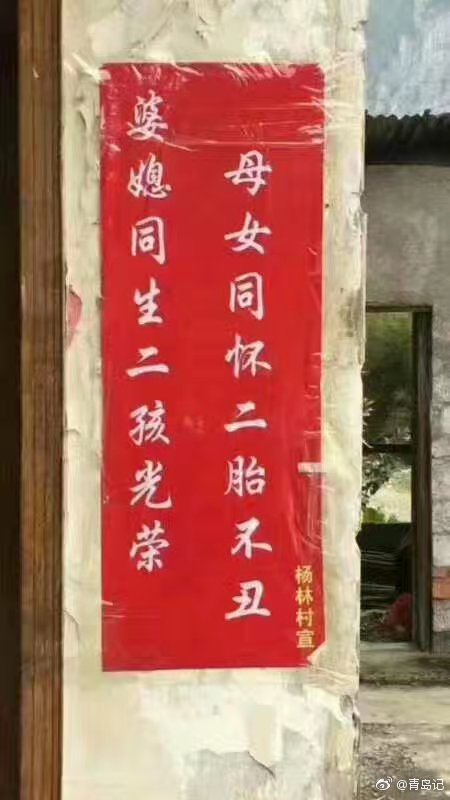Two-child policy
« previous post | next post »
Under the one-child policy, which was in effect in China from 1979 till just recently, the following exhortation posted on the wall of a village house in China would have been unthinkable:
So unthinkable would such a poster have been during the last three decades and more that I scarcely could believe my eyes when I saw it. Although I could read the characters, I experienced a kind of cognitive dissonance when I tried to make sense of what was written on the poster:
mǔnǚ tóng huái èr tāi bù chǒu
póxí tóng shēng èr hái guāngróng
母女同怀二胎不丑
婆媳同生二孩光荣
It is not disgraceful for a mother and daughter to have their second pregnancies at the same time;
it is glorious for a mother-in-law and daughter-in-law to give birth to their second child at the same time.
After decades of encouraging, enjoining, and enforcing women to have only a single child, the government is now shifting gears to a two-child policy. Why is this happening? Sheer demographics: geriatrification of the population and a decline in the work force in proportion to the number of people that must be supported.
No wonder that a netizen made the following cynical comment upon seeing this poster circulating on a microblog:
Dāng nǚxìng shì chùshēng a, gāi shēng de shíhou bù gěi shēng, děng niánjì dà wèi le rènwù yòu gèzhǒng bīzhe shēng.
當女性是畜牲啊,該生的時候不給生,
This is to treat women as though they were beasts: not letting them give birth when they ought to give birth, then waiting till they're old and using various means to compel them to give birth to fulfill a mission.
The four small characters at the bottom right of the poster read:
Yánglín cūn xuān 杨林村宣
("Yanglin Village Propaganda")
Propaganda in China comes in all shapes and sizes. Cf. "Rapaganda" (3/11/17), which also discusses "popaganda" and "pandaganda".
[h.t. Mandy Chan; thanks to Fangyi Cheng and Yixue Yang]

Bathrobe said,
March 17, 2017 @ 5:27 pm
My first instinct was to read the text starting from the lefthand line. Firstly, the righthand line starts lower than the left, making lefthand line more prominent. Secondly, the identification of the posting body, which should come at the end of the message, is at the far right.
Traditionally, of course, vertical text runs from right to left, but people in China seem to forget this a lot. I've seen a number of examples of vertical text in China that is meant to be read from left to right.
On the other hand, the fact that the righthand line is lower than the left can be explained by the convention of indenting the start of the paragraph, a practice that appears to have been borrowed from the West (although normally the indentation is two characters). The rigid application of this convention can lead to strange effects when applied to signs, and this could be one example.
Anonymous Coward said,
March 17, 2017 @ 6:09 pm
Bathrobe: I think it's meant to be read right-to-left. The two parts of a couplet always end first in a zè-toned, then in a píng-toned syllable.
liuyao said,
March 17, 2017 @ 7:10 pm
I was thinking the same, but being a village level propaganda, one can't expect the couplet to strictly follow the standard rules. In fact, the repetition of the characters 同 and 二 at the same location would be evidence.
Bel Hasenorl said,
March 18, 2017 @ 5:08 am
Reminds me of a part in 1984:
"She even used to remind him of it in the morning, as something which had to be done that evening and which must not be forgotten. She had two names for it. One was 'making a baby', and the other was 'our duty to the Party' (yes, she had actually used that phrase). "
John Swindle said,
March 18, 2017 @ 5:13 am
Apart from formal considerations, the content requires reading from right to left. The bit about "glorious" at the end is supposed to redeem the offensive stupidity of the sign.
BZ said,
March 20, 2017 @ 12:09 pm
Does it literally mean "propaganda"? In English (and Russian) nobody would call what they do "propaganda" even if that is exactly what it is. It just has an extremely negative connotation.
Victor Mair said,
March 20, 2017 @ 1:14 pm
@BZ
Yes, it does mean "propaganda".
In the PRC, xuānchuán 宣传 ("propaganda; publicity") is considered to be something positive and necessary.
So far as I know, the word for "propaganda" in Russian is Пропаганда.